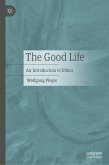This book turns to virtue language as an important resource for understanding moral injury, a form of subjectivity where one feels they can no longer strive to be good as a result of wartime experience. Drawing specifically on Iris Murdoch's moral philosophy, and examining the experiences of civilians during the Bosnian War (1992-5), Joseph Wiinikka-Lydon argues that current research into war and current understandings of subjectivity need new ways to articulate the moral dimension of being a subject if we are to understand how violence affects one's moral being and development. He develops an understanding of the human person as a tensile moral subject, one that forefronts the moral challenges and vulnerability inherent in lives affected by war. With these resources, Wiinikka-Lydon argues for a moral vocabulary and images of the human as a moral being that can better articulate the experience of violence and moral injury.
Dieser Download kann aus rechtlichen Gründen nur mit Rechnungsadresse in A, B, BG, CY, CZ, D, DK, EW, E, FIN, F, GR, HR, H, IRL, I, LT, L, LR, M, NL, PL, P, R, S, SLO, SK ausgeliefert werden.









